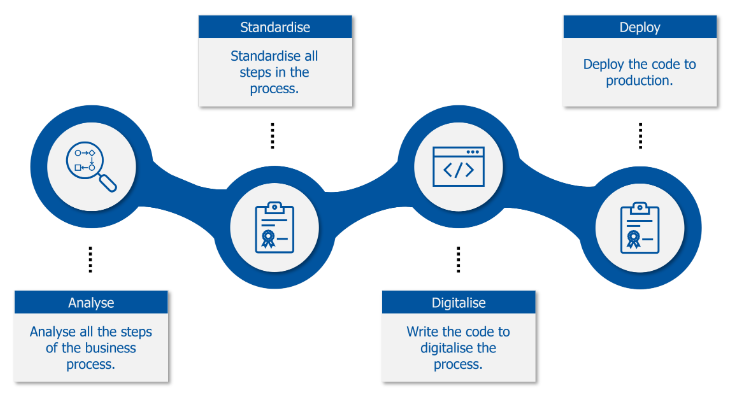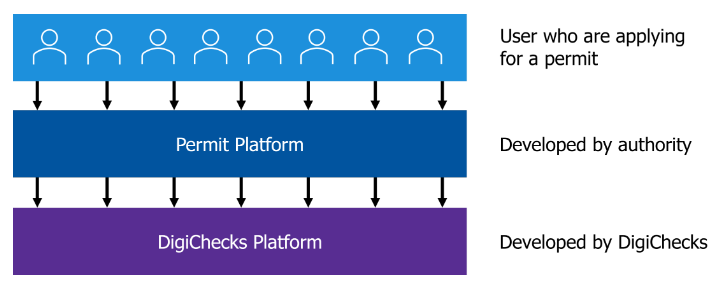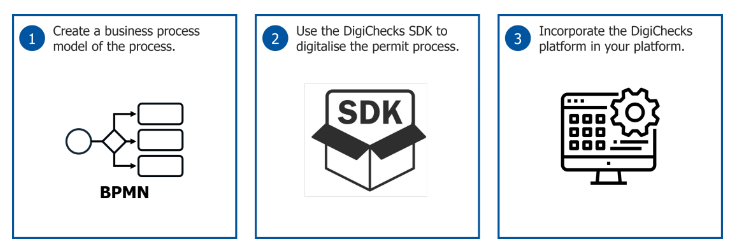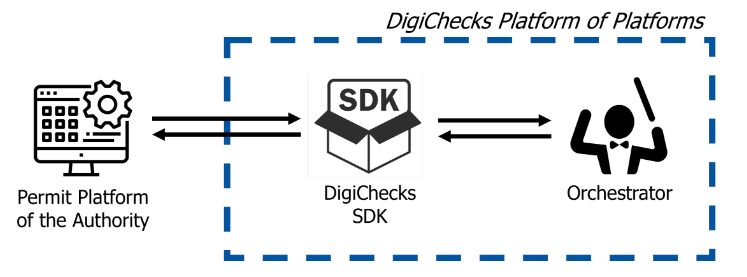DigiChecks: How You Can Develop Your Own Permit Application Platform
Navigating the world of permit management in construction can feel like a maze. Each municipality has its own set of rules, making standardisation a daunting task. But the EU-funded DigiChecks project offers a fresh perspective. Instead of trying to force all permit processes into a single digital solution, DigiChecks takes a different approach. It understands that every municipality is unique and offers a modular solution that allows them to digitalize their processes their own way. In this article I will explain how we aim to achieve this.
Why Standardizing the Process Wouldn’t Work
When asked to digitalise a business process, one of the first steps I take is to standardise them (see Figure 1). This is the approach I would take when asked to digitalise a single permit process. However, it’s a different story when we are asked to digitalise all permit processes within the European Union (EU). With over 20,000 approving authorities across the EU, each with its unique processes and methodologies, the task of standardising all these processes becomes enormous.
The complexity of standardising such a wide range of processes is overwhelming. The sheer volume of work required to standardise these processes and develop the necessary code is staggering. Moreover, even if an application were developed to digitalise all permit processes, the challenge arises when regulations require a change in a particular process. Such changes would render the application unusable, highlighting the fragility of relying solely on standardized digital solutions.

Figure 1: How I digitalize business processes
A Platform of Platforms
Developing a single application will thus not be a suitable solution. We need a modular platform that can adapt. Therefore, we are enabling authorities to build their own solutions for their specific permit processes. We call this the “Platform of Platforms” approach. The authorities will use the DigiChecks platform to efficiently develop their own permit platform. A user (anyone who wants to apply for a permit) then uses that permit platform to apply for a permit, see Figure 2. In essence, this ‘Platform of Platforms’ approach transforms the permit process into a set of standardised steps, like Lego blocks.

Figure 2: Users (anyone who applies for a permit) will interact with the permit platform developed by the authority. This permit platform is developed with the DigiChecks platform.
Developing Pieces of Lego
Even though every permit process is unique, they share similar steps, for example, uploading documents, sending a notification, or running a compliancy check. If we focus on these steps there suddenly is a finite amount of steps and we can break the processes down into simpler parts, like Lego blocks.
Writing the code for a Lego block (step in the permit process) can be done with relative ease, since the step can be standardised. For a notification this would, for example, require an user to specify the recipient, subject and content of the message. If we repeat this digitalization for a lot of steps, we end up with a box full of Lego blocks which can be used by authorities to digitalize their permit process. This box is the DigiChecks Software Development Kit (SDK).
Digitalising the Process: Connecting the Lego with the Process
The similar steps, for example sending a notification, between the processes are all integrated in the DigiChecks SDK (the box of Lego blocks). But, we still have the unique permit processes which must be modelled. To standardise the modelling of business processes we use the Business Process Modelling and Notation (BPMN) standard. This is a flow chart method which can be used to model a business process. Furthermore, it can be exported to a standard file, .bpmn.
So, we now have the DigiChecks SDK, with the digitalised steps, and the BPMN standard, with the standardised way of modelling a process. To connect the two, we include an importer in the SDK in order to import the .bpmn. Leveraging the SDK, the digitalised steps are mapped to the tasks of the business process, resulting in a digital version of the permit process. This approach bypasses the complexity of standardising all processes, enabling the digitalisation of all permit processes within the EU.

Figure 3: Steps to implement DigiChecks in your application.
However, we still have one challenge to solve: how do we execute this digitalised process? Enter the heart of the DigiChecks project: the orchestrator, tasked with running the processes. Communication with the orchestrator is facilitated through the SDK. It will manage requests like starting a permit application process and retrieving the status of a permit application.
The SDK enables the platform of platform approach and with it authorities can efficiently develop their own permit platform to digitalize their permit application processes. In Figure 4 a schematic overview of the DigiChecks platform of platform approach can be found. This figure highlights the interaction between the permit platform of the authorities, DigiChecks SDK and the orchestrator.

Figure 4: relation between the permit platform of the authorities, the SDK, and the orchestrator.
Conclusion
In conclusion, the DigiChecks project implements a modular solution rather than an effort to enforce standardisation. By offering a Software Development Kit (SDK) and managing the orchestration of processes DigiChecks empowers authorities to digitalise their permit processes in a way that suits their individual needs and develop their own permit application platform. This flexibility not only simplifies the digitalisation process but also provides adaptability to regulatory changes, mitigating the fragility of relying on a fully standardised solution.
Benieuwd geworden hoe we jou kunnen helpen?
Neem contact met ons opVergelijkbare artikelen
Er zijn (nog) geen vergelijkbare artikelen, maar houdt ons in de gaten.